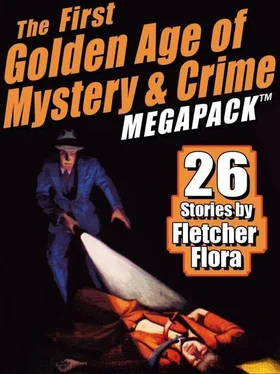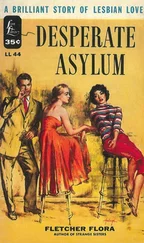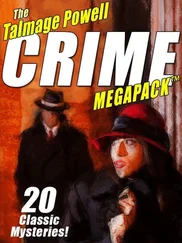“Naturally. I’ll sleep better if I have a report.”
“Here?”
He shook his head. “Not here. I’ll be with a few boys at the Line Club. About eleven I’ll slip out to the Caddy in the parking lot in back. You know my slot. Come there.”
“I’ll come. About eleven.”
“You’re a good boy, Carey. You’re Campan’s good boy. You sure you don’t want a drink?”
“I’ll have it with Phyllis, if you don’t mind. She’s prettier.”
Campan was pleased, and he laughed. It pleased him to have people tell him how pretty Phyllis was. She was his property, and it was right that Campan’s property should be a credit to him. It was good that people should envy Campan his property.
“Sure,” he said. “Campan’s good boy and Campan’s pretty wife. Have your drink together.”
“Thanks.”
Carey stood up and went out into the hall and down the hall into the living room again. Phyl had a shaker ready. She poured twice and held out a glass. He went over and took hold of the wrist behind the glass and pulled her to him, and she stood leaning against him with her arms spread and a glass in each hand and her face lifted for his kiss. When the kiss was over, she stepped back with a deep breath that was like a shudder running through her body. She lifted her glass and drained it and turned away to set the empty glass on a table.
“Too bad you’re just a handyman,” she said. “Too bad you’re just big enough for odd times.”
“Sure,” he said. “Too bad. Do I get that other drink?”
She turned back and handed it to him, and he drank it and dropped the glass on the carpet and set his foot on the glass deliberately. She looked down at the foot on the glass and listened to the grating sound of shards being ground into rich wool pile.
“See you later,” he said. “Some other odd time. Right now I’ve got an errand to run. Campan’s good boy with an errand to run.”
He left the apartment and went downstairs to his car in the street.
In the car, he drove to a bar where the name and tastes of Carey Regan were known. Without having to specify it, he got a bourbon on the rocks and sat on a stool in cool shadows and nursed it. There was a baseball game on television, and one team was ahead, but then the other team tied it, and it was the ninth frame, and it looked like extra innings. Which it turned out to be. He nursed the bourbon through inning ten and got a fresh one for inning eleven, and in the top of the eleventh the visitors scored once on a double and a single back to back, but then in the bottom of the eleventh the crumby pitcher walked a pair and threw a gopher ball, so the home team won by two, and everyone lined up at the bar seemed to think it made a pretty exciting and satisfactory game, and anyhow the game and the second bourbon were finished at the same time. Carey got off his stool and went back to his car and drove to his apartment, which was smaller than Campan’s and cheaper than Campan’s and just about right for Campan’s right arm.
In the apartment, he took off his coat, took off his tie, sat in a chair. That’s all he did. Just sat in a chair. He didn’t drink, he didn’t smoke, he almost didn’t move. This was a kind of conditioning process and was something he always did when there was a job to do that was a little bigger than the usual jobs. It was peculiar how it worked. He sat there for a long time, for hours maybe, and he didn’t do anything but think of this and that, whatever came into his mind, and all the while the thought of the job was there too, the thought of the job that had to be done, and he could feel the hardness start and spread outward from a tiny core in the center of him, the cold impervious hardness that was like stone and made him a stone man, and when it was time at last to go on the job he was someone who could do this job or any job in the world.
The last part of the afternoon passed, and the time for eating passed without recognition, because there is no hunger in stone, and the first part of the evening passed in turn. He thought about the Swede, the legend of him, how he had started from nothing and grown to something and how he would soon go back to nothing much faster than he had come from it, and he thought of Campan, drop the Joseph, and of what a bad day it had been for the Swede when Mrs. Campan, not Phyl, had gone into confinement with her sixth son, the same Joseph before the drop. From there it was quite natural to pass on to the thought of Mrs. Campan, Phyl, and of numerous odd times that might become steady times it only a man got big enough to drop a name or fill a place someone moved out of. He thought of these things, as well as other lesser things, and lights came up in the streets outside, and time passed, and it got to be nine-thirty.
Getting up from the chair, he put on a shoulder harness and put a silenced .45 in the holster under his left arm and put his coat on over the harness and the holster and the .45. Then he remembered the tie he had taken off and he put that on too, standing in front of the mirror in the bedroom and watching the sure, stone hands fashion the knot and never seeing at all the face above the hands. The knot tied and adjusted, he went downstairs to the street and his car and started for Twelfth and on the way to the narrow street in the shabby section where the Swede had started and would shortly end (cross fingers and never doubt it), he began for the first time to think in detail about the best way to do the job.
They would be in the little office, the Swede and Johnny Derry, and chances were they would be alone, the pair of them, although there was an outside chance they would not, and if they were not it would be just too bad, but this was a chance a right arm had to take on a job like this, and anyhow they would probably be alone, just the pair of them. One way would be to go up and knock and go in when invited, but then they would see that it was not Campan, but Campan’s right arm, and this would certainly make them wary and reduce the chance of success. Another way, the only other way that he could think of, since the window was not accessible, was to go up and knock but not go in when invited, standing instead in the hall and doing the job from there, with only seconds, maybe three, allowed between the time the door was opened and the time the job was finished. It was such a small room that he could easily reach anyone in it who was not right up against the wall the door was in, and this was another chance to be taken. It would be better if he didn’t have to knock at all, if the door were unlocked, but this was not to be anticipated because the Swede was a great one for locking doors as a justified precaution.
He reached Twelfth and drove down it and parked his car a block above the building in which Johnny and the Swede sat waiting for something they didn’t expect. He walked the block in the shadow of buildings and turned into the entrance to the building and climbed narrow stairs to a narrow hall, and the air in the hall was hot and oppressive, and it stank. He walked down to the door to the Swede’s old office and knocked and as he knocked with one hand the .45 was in the other.
Beyond the door. Johnny Derry’s voice said, “Who is it?” and he answered, “Campan,” in Campan’s voice, which was a trick he’d perfected for practical purposes.
The lock clicked, and the door opened, and there was Johnny like a sitting pigeon, acquiring and losing in a terrible instant the knowledge that he had made a mistake that would be his last one. The .45 coughed, and he was pushed back out of the way as if by the breath of it, and beyond him, behind an ancient desk which was another item of sentiment, the Swede moved with a jerk in the desperate exigency, but the Swede was getting old, the Swede was getting slow, and now he was too old and too slow to live, but not to die, and he fell back into the chair and slipped sidewise out of it and was swiftly dead before he reached the floor. Johnny, who had begun dying first, was not yet dead. He lifted his head from the floor and coughed blood and was dead then. Carey put the .45 away and went downstairs and rewalked the block to his waiting car.
Читать дальше












